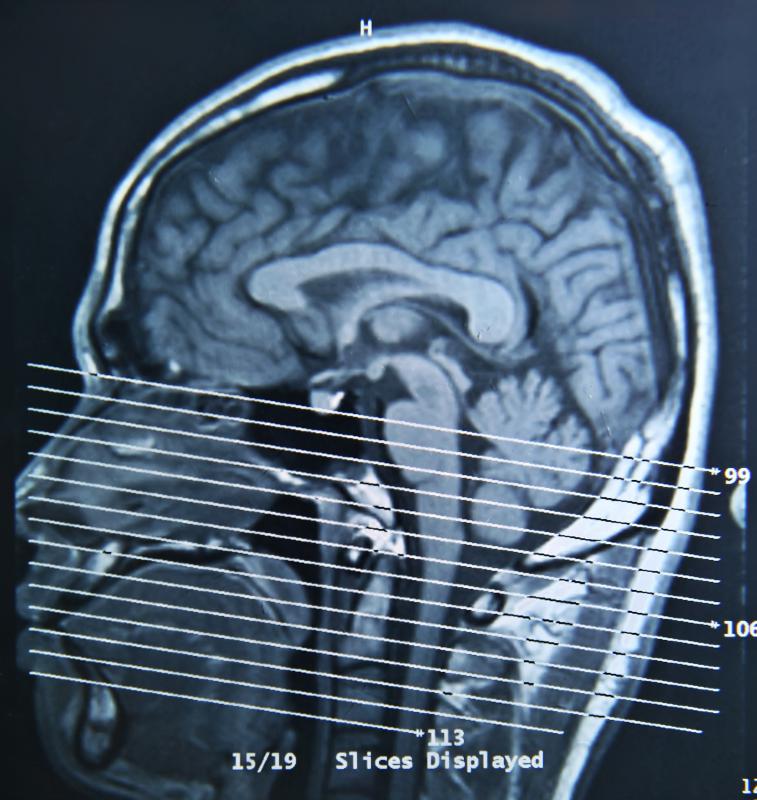At WiseGEEK, we're committed to delivering accurate, trustworthy information. Our expert-authored content is rigorously fact-checked and sourced from credible authorities. Discover how we uphold the highest standards in providing you with reliable knowledge.
What is the Locus Coeruleus?
The locus coeruleus is an area of the brain which acts to regulate the level of activity in the brain. It is closely involved in the waking and sleeping cycle, and plays a number of other roles as well. The name of this structure literally means “the blue spot,” a reference to the bluish color it has in fresh brain tissue as a result of the presence of cells which contain higher concentrations of melanin.
This structure is located inside the brain stem, deep within the area known as the pons. The locus coeruleus is quite small, but has a long reach. Despite the fact that it is a tiny nubbin within the brain, its neurons connect with many areas of the brain, networking with areas responsible for sensory processing and many other activities. One could think of the locus coeruleus as a very long-limbed spider poised in the middle of the brain, with legs touching key areas.

Noradrenaline production is moderated by the locus coeruleus. This structure decides how much noradrenaline to produce and when, which determines how alert and awake the brain is. Production of noradrenaline occurs in response to sensory input which the locus coeruleus sorts through to determine the correct level of response. When someone glances at a dog, for example, the brain recognizes the animal as probably harmless, and it stays at a low level of excitation. A charging wolf, on the other hand, would trigger a surge of noradrenaline, a high state of alertness, and a stress response.

Stress and panic responses are an important part of what the locus coeruleus controls, but this structure is also involved in making memories, processing emotions, motivation, and attention. By moderating alertness levels, it can make the brain sluggish or more active, providing it with more energy to focus or overloading it in response to stress. The locus coeruleus neurons are constantly active, processing and sifting through information to identify relevant pieces which are used to regulate the brain's “speed,” so to speak.

The effects of the locus coeruleus can be seen in brain scans which measure brain activity. When a flood of noradrenaline is released, the brain lights up, often in multiple areas, as it kicks into high gear. When people are sluggish or resting and noradrenaline production is low, the brain is correspondingly inactive, with lower noradrenaline levels to excite it, keeping it in a less alert state.
AS FEATURED ON:
AS FEATURED ON:














Discussion Comments
@lighth0se33 - It helps to joke around with the crowd a bit, if possible. I used to feel that scared rush when speaking in public, but I found out that starting out with a couple of jokes eased my nerves significantly.
Once I see people laughing and loosening up, my locus coeruleus sees that my proverbial tiger is only a house cat. It realizes that I am not in danger, and it stops producing so much adrenaline.
I realize that there are instances where joking would not be appropriate. For those, consider using empathy instead. Look into your audience members’ eyes as you speak, and try to draw upon their emotions. Just feeling connected and on the same level as your audience will minimize the threat level you perceive.
My locus coeruleus often gets confused about potential danger. I tend to jump at every rustle of leaves, and as soon as I become alert, I feel a rush.
It only takes a few seconds for my mind to recognize that the danger isn’t real. Then, the rush fades, and I feel a little shaky for awhile, but I get back to normal before long.
Another thing that always gives me a shaky rush is speaking in public. My mind and body react the same way when I get up in front of a crowd as they do when I see a snake in my path. The fear and the rush last through my entire speech.
Does anyone know how I can overcome this? It is really a drain on my system to feel that scared for fifteen minutes.
@OeKc05 - My husband experienced a lot of anxiety and that same metallic taste, and he went to a doctor about it. The doctor told him that his locus coeruleus was sending adrenaline out into his body, but his altered mental state and lack of exercise were causing it to linger longer than it should have.
Adrenaline causes the metallic taste that usually fades away. In my husband’s case, he was under a lot of stress, so it stayed with him.
He tried meditation, which helped ease his mind a bit. He started exercising, and this let his body burn up the adrenaline.
He began feeling less anxious, and the metallic taste disappeared. Once he got his mental state under control, his locus coeruleus stopped releasing unnecessary adrenaline.
I have felt that adrenaline rush before from dangerous situations. I never knew that it was coming from my locus coeruleus though, because I had never heard of this before reading the article.
Usually, I get my adrenaline rushes while driving. If someone is about to pull out in front of me, I feel a surge of panic, followed by a metallic taste on my tongue. Does anyone know what causes this taste?
My heart pounds for several minutes, and the taste goes away as my mental state returns to normal. I just find it strange that it occurs at all!
Post your comments